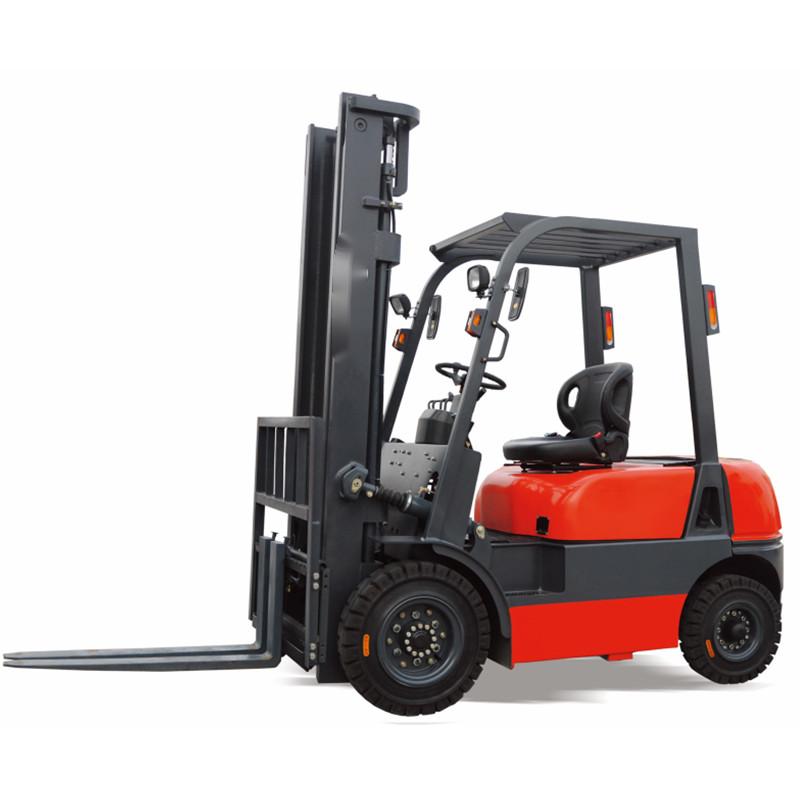Large electric forklifts and fuel-powered forklifts (mainly diesel forklifts) each have their own characteristics, with their advantages focusing on different scenarios. Generally speaking, electric forklifts have significant advantages in terms of environmental protection, operating environment, and maintenance costs, while fuel-powered forklifts are more competitive in terms of power sustainability and adaptability to heavy loads. The following is a detailed comparative analysis from multiple dimensions:

I. Core Advantages of Electric Forklifts
- Better Environmental Performance
- Zero exhaust emissions: Electric forklifts are driven by batteries and produce no exhaust gases (such as carbon monoxide, nitrogen oxides, etc.) during operation. They are especially suitable for closed or semi-closed environments with high air quality requirements, such as indoor warehouses, food processing plants, and pharmaceutical workshops, as they can avoid polluting goods (such as food and medicines) and operators.
- Low-noise operation: The noise of motor operation is usually 60-70 decibels, which is much lower than that of diesel forklifts (over 90 decibels). This can reduce hearing damage to operators and is also suitable for noise-sensitive places (such as logistics centers near residential areas).
- Lower Operation and Maintenance Costs
- Low energy cost: The cost of electricity is usually lower than that of diesel or gasoline. Long-term use can save a lot of fuel costs, especially in areas with low electricity prices.
- Simpler maintenance: The structure of electric forklifts is relatively simple (without complex components such as engines and gearboxes). Daily maintenance mainly involves batteries, motors, and hydraulic systems. There is no need to frequently replace engine oil, filters, etc. The maintenance cycle is longer, and labor and parts costs are lower.
- Easier operation: The motor has a fast response speed, and starting and speed regulation are more stable. There is no need for clutch operation, which has slightly lower requirements for the proficiency of operators and can reduce operational errors.
- Better Safety and Comfort
- No risk of fuel leakage: It avoids the fire hazard caused by diesel leakage, and is especially safer in warehouses storing flammable goods.
- Low vibration: The vibration during motor operation is much smaller than that of internal combustion engines, which reduces the fatigue of operators during long-term work and improves work comfort.
II. Core Advantages of Fuel-powered Forklifts (Taking Diesel as an Example)
- Strong Power and Stable Endurance
- Large torque and strong explosive power: The power output of diesel engines is more suitable for heavy loads and long-distance transportation (such as container transportation in ports and docks), and it performs more reliably especially when climbing with full load or on complex terrains (such as muddy roads).
- Endurance not limited by batteries: Refueling takes a short time (it can be filled in a few minutes), enabling 24-hour continuous operation. It is suitable for scenarios requiring high-intensity and uninterrupted operation, without the need for frequent charging or battery replacement like electric forklifts.
- Stronger Ability to Adapt to Harsh Environments
- Good high and low temperature resistance: In extremely low temperatures (such as winter in northern regions) or high-temperature environments, the starting and operation stability of fuel-powered forklifts is better than that of electric forklifts that rely on batteries (battery performance is easily affected by temperature).
- Low requirements for infrastructure: No special charging equipment or charging stations are needed, only fuel storage is required. It is more suitable for outdoor, remote, or temporary work sites.
III. How to Choose? The Key Depends on the Scenario
| Characteristics of the Scenario | More Suitable Type | Core Reasons |
|---|---|---|
| Indoor operation, high environmental protection requirements | Electric forklift | Zero emissions and low noise, meeting the health and safety standards of closed environments |
| Light to moderate load, fixed working hours | Electric forklift | Low energy cost, simple maintenance, and charging can be arranged during non-working hours (such as at night) |
| Outdoor heavy load, high-intensity operation | Fuel-powered forklift | Strong power, unlimited endurance, adapting to complex terrains and continuous operation needs |
| Low/high temperature environment, remote sites | Fuel-powered forklift | Less affected by the environment, no dependence on charging infrastructure, and more stable starting and operation |
Summary
Large electric forklifts have advantages in environmental protection, low cost, and comfort, making them suitable for scenarios with high requirements for the environment and operating conditions. Fuel-powered forklifts, on the other hand, have advantages in power, endurance, and environmental adaptability, making them more suitable for outdoor heavy-load, high-intensity operations or operations with imperfect infrastructure.


